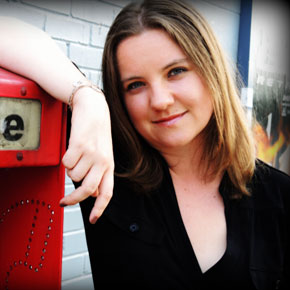Fremantle Press poet Caitlin Maling on winning the 2017 Patricia Hackett Prize

Fremantle Press poet Caitlin Maling has been awarded the prestigious 2017 Patricia Hackett Prize.
Each year, Westerly magazine awards the prize to the strongest work published in an issue of the magazine in the preceding year.
Maling’s work, a creative non-fiction piece titled ‘Travelling Through the Dark: Six Weeks in Oregon’ featured in issue 62.1 of the esteemed literary journal.
The judges said, ‘Evocative and honest, Caitlin’s writing weaves together her outer and inner worlds. Her piece is a celebration of the dynamic movement of the creative process, and a reminder that travelling can take place in the stillest of moments.’
Fremantle Press caught up with her to find out how a poet came to win an award for prose.
How do you feel to have been awarded the Patricia Hackett Prize?
Very surprised, but delighted. It’s the best type of prize, one you don’t even know you’ve been entered into. I so rarely submit prose that it was doubly nice. I refer to prose as ‘words-in-a-row’; it doesn’t make intuitive sense to me the way poetry does, but there was something nice about ‘with the trouble’ as Donna Haraway puts it.
What were you doing when you found out you’d won?
I was actually staying on Lizard Island Research Station on the Great Barrier Reef working on a collection in progress and doing the final edits on Fish Song, my poetry book coming out with Fremantle Press next year. So I would have been somewhere between snorkelling and poems.
You’re following in the footsteps of renowned WA writers by receiving this award. How does that feel?
It’s a pretty stellar line-up. I think about the piece by the emerging writer Timmah Ball that won the prize in 2016 quite a lot, so as much as I love to be in ‘renowned’ company, I’m just as excited to be next to such strong new talent.
You’re best known for being a poet. Why did you decide to submit a creative non-fiction essay? What inspired the piece?
Catherine Noske, the editor at Westerly, asked me if I wanted to write a craft essay for the journal to go with a review of my poetry collection Border Crossing. Linear prose is tricksy for me, so I decided to think about the essay in terms of the poetic form it was discussing and try to embrace what I love about the poetic leap in prose – the moving quickly between and over things.
At the time I had just returned to Perth from living overseas, so it made sense to me that the piece embodied this kind of travelling. It ended up quite far from the traditional craft essay, but luckily Catherine loved it. I really love reading creative non-fiction, so it was a joy to stretch myself in this area.
How often do you submit to Westerly?
Whenever I remember. Westerly has long been a supporter of my work, across multiple editors and poetry editors and I’m thankful for that. I think the direction the journal is moving in, and the amount of time and effort they put into developing the writing scene in WA, is amazing.
What’s your view on the literary industry in Western Australia at the moment? What would you like to see happen in the next five years?
I can’t presume to be an authority on the literary industry in WA as I split my time between WA, NSW and other places. But from what I know and the bits I’m lucky enough to intersect with, it’s nurturing a lot of really strong emerging talent, while the strong community organisations continue to really refine and deepen the poets that have been working for a while.
A strong literary culture needs a strong funding culture, so in the next five years my dream would be to see the state funding for the arts completely reinstituted and made even more robust.
Border Crossing and Conversations I’ve Never Had are available to buy from the Fremantle Press website and all good bookstores. Caitlin Maling’s next poetry collection, Fish Song, will be published in 2019.


